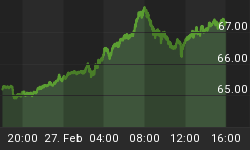For years the Federal Reserve has told us that in order to detect inflation in the economy it is important to separate "signal from noise" by focusing on "core" inflation statistics, which exclude changes in food and energy prices. Because food and energy figure so prominently into consumer spending, this maneuver is not without controversy. But the Fed counters the criticism by pointing to the apparent volatility of the broader "headline" inflation figure, which includes food and energy. The Fed tells us that the danger lies in making a monetary policy mistake based on unreliable statistics. Being more stable (they tell us), the core is their preferred guide. Sounds reasonable...but it isn't.
If it were truly just a question of volatility the Fed may have a point. But for headline inflation to be considered truly volatile, it must be evenly volatile both above and below the core rate of inflation over time. If such were the case, throwing out the high and the low could be a good idea. However, we have found that for more than a decade headline inflation has been consistently higher than core inflation. Once you understand this, it becomes much more plausible to argue that the Fed excludes food and energy not because those prices are volatile, but because they are high.
If you talk about the grand sweep of Fed policy, it's fairly easy to fix the onset of our current monetary period with the onset of the dot.com recession of 2000. To prevent the economy from going further into recession at that time, the Fed began cutting interest rates farther and faster than at any other time in our history. During the ensuing 11 years, interest rates have been held consistently below the rate of inflation. Even when the economy was seemingly robust in the mid years of the last decade, monetary policy was widely considered accommodative.
Over that time annual headline Consumer Price Index (CPI) data has been higher than the Core CPI 9 out of 11 years, or 81% of the time. Looking at the data another way, over that time frame, the U.S. dollar has lost 20% of its purchasing power if depreciated year by year using core inflation, and 24% if depreciated annually with headline inflation. The same pattern held during the inflationary period between 1977 thru 1980, when the Fed's massive money printing sent the headline inflation rate well above the core reading. The empirical evidence is abundantly clear. When the Fed is debasing the dollar, headline inflation rises faster than core. The reason for this is clear. Food and energy prices are closely exposed to commodity prices which have a strong negative correlation to the falling dollar that is created by expansionary policies.
Data we have seen thus far in 2011 underscores the need to focus on headline inflation and to avoid the trap of relying on the relatively benign core. The difference between the core rate and headline rate of inflation was .6 percent in January and a full percentage point in February. If annualized those relatively small monthly disparities will become enormous.
It is shocking how few Americans, even those with economic degrees and press credentials, fully appreciate the Fed's vested interest in reporting low inflation. With benign data in hand, Fed policy makers are given a free hand in adopting stimulative policies. Central bankers who shower liquidity on the economy earn the gratitude of their peers and the thanks of their political patrons. But once a central bank goes down the expansionary path to fight recession it is much easier to keep pumping money than to reverse course when inflation starts to bite into purchasing power.
The sad truth is that the Fed's record low interest rates are once again causing food and energy prices to rise much faster than core items. Bernanke is focusing on the core just as we need him to focus on the headline. It's time for the Fed to stop hiding behind flimsy statistical juggling and to start protecting the value of our dollar, which unfortunately is in free fall no matter what statistics one chooses to use.
Subscribe to Euro Pacific's Weekly Digest: Receive all commentaries by Peter Schiff, Michael Pento, and John Browne delivered to your inbox every Monday.
Click here for free access to Euro Pacific's new special report: What's Ahead for Canadian Energy Trusts?
Be sure to pick up a copy of Peter Schiff's hit economic fable, How an Economy Grows and Why It Crashes.















